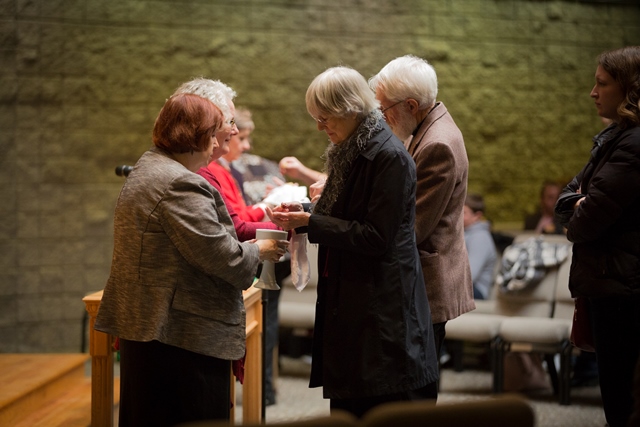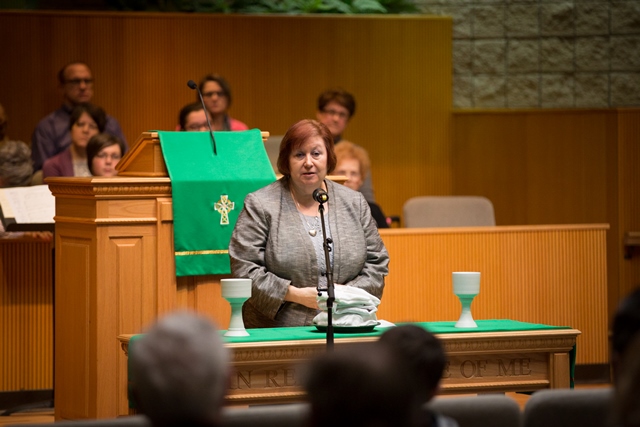By Jeff Brumley
An all-woman team served communion at Spring Creek Baptist Church last Sunday. That was Pastor John Jay Alvaro’s idea of taking the Martha Stearns Marshall Month of Preaching to a new level at his Oklahoma City church.
What Alvaro hadn’t envisioned was that the presiding minister and five servers would have ideas of their own on how to conduct the monthly ritual.
“When I serve, I take the elements from the table and carry them to the deacons” at their two stations, Alvaro said. “But in this situation, they all came to the table and gathered the elements and took them back to their places [to distribute].”

The unscripted change even took Suzan Benson, the presiding minister, by surprise.
“It was very spontaneous,” said Benson, a deacon at the church.
With a few days to reflect on it, Alvaro said he also thinks it was a good idea.
Transforming leadership
One context for Sunday’s experience was embracing the spirit of Stearns Marshall preaching month. Each February, Baptist churches are encouraged to participate by inviting women to preach.
“This is an opportunity for you to publicly voice your support of women in ministry,” the Baptist Women in Ministry website explains. It’s also a way “to be counted with other Baptist churches in celebrating the calling and gifts of women, and to remind your congregation that God does indeed call women to the work of the kingdom.”
Alvaro said a woman associate pastor from a neighboring church will preach at Spring Creek at the end of February.

But he saw the communion service, held the first Sunday of every month, as another way to enhance the congregation’s experience of women in ministry.
So women performed every element of the service except the sermon, which was preached by Alvaro.
“It was an effort to intentionally and viscerally elevate the role of women,” he said. “We wanted to have that sort of feminine spirituality saturate our worship as much as we could.”
Also, it’s an approach Alvaro said he and his staff are constantly seeking to push beyond special preaching months for women.
The church is exploring ways to give more pastoral duties to women, both staff members, deacons and members who are ordained.
“And give them more liturgical duties,” Alvaro said. “I am fascinated with what it would be like to turn [leadership] on its head.”
Elevating women
That desire goes back further.
Alvaro recalled being at a church service with his wife in a Bible college. She was struck with the all-male communion service. Women weren’t allowed, but teen-age boys were. They wondered what it would be like if a daughter of theirs grew up in that environment.
Even in congregations where women are deacons, those women often are limited to nurturing roles.
“The ordained mantle doesn’t extend to you just when you are preaching, but to all the sacramental duties,” he said.
Alvaro said the female-led service last Sunday reinforced the concept to him that the pulpit is not the sole source of leadership at Spring Creek.
“We are trying to elevate women and spread pastoral authority outside the role of the senior pastor,” he said. “And it’s me divesting some power from my office to the rest of the staff.”
‘They came to me’
For Benson, the power involved Sunday seemed to come from a higher source. She said it took some time after the service to realize how powerful it had been.
“That was my first time to lead communion, so that was different for me,” she said.
Before the service, Benson met in Alvaro’s office to choreograph the flow of the morning.

However, the servers were unable to make it, and the first time they were together was that morning at the altar. Benson said she set out to follow the order she and Alvaro discussed.
“I was intending to take the elements to them as he does,” she said. “And as I got ready to do that, they came to me.”
Surprise was followed by an intuition that the initial plan was never meant to be followed.
“I thought ‘this is not how it’s supposed to go,’” Benson said. “But then I realized that’s the way it was supposed to go.”
— Baptist News Global’s reporting on innovative congregational ministries is part of the Pacesetter Initiative, funded in part by the Eula Mae and John Baugh Foundation.
